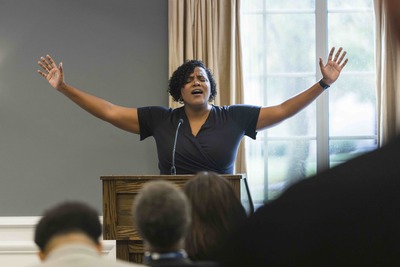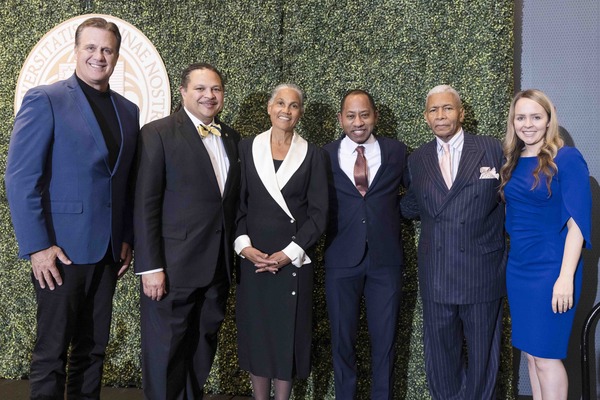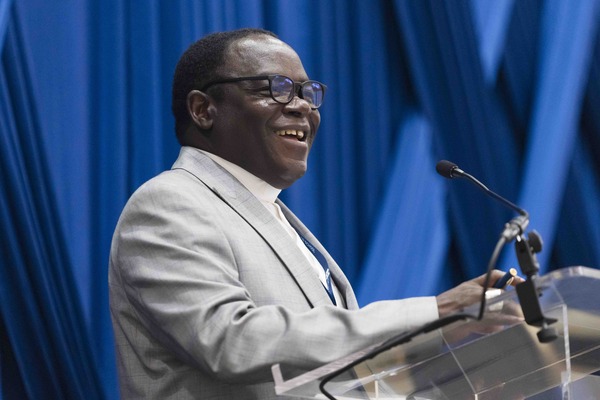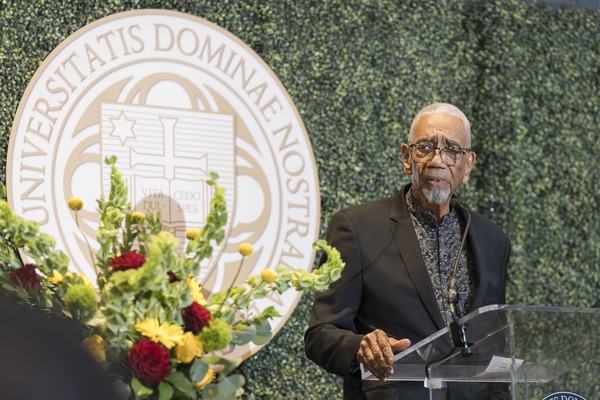Black Church & Religious Freedom Conference celebrates the profound influence of the Black Church on advocating for religious freedom and racial justice

The Black Church has served as a safe haven for the Black community, and continues to uplift and provide a place of refuge. Since its inception, the Black Church has stood as the foundation of Black religious, political, economic, cultural, and social life, driving people to recognize and see its power beyond the prism of a religious institution. Its music and linguistic traditions have extended across popular culture, and its scriptural tenets have helped form our understanding of core values such as equality, freedom, and love.
During the civil rights movement, Black places of worship played an even more significant role. They hosted congregations, were meeting points for marches and rallies, and provided individuals with emotional, physical, and spiritual support. The Black Church offered members of the Black community a revitalized sense of solidarity and strength to endure hardship — ultimately leading to the protection of equal rights for every American, regardless of color or creed.
In honor of the Black Church’s profound influence on advocating for religious freedom, Notre Dame Law School’s Religious Liberty Initiative hosted the Black Church & Religious Freedom Conference at the University of Notre Dame in September 2023, in collaboration with the Seymour Institute for Black Church and Policy Studies. The two-day event sought to recognize the University of Notre Dame as a place where people of different faiths are welcome to come together to pursue religious freedom and to establish Notre Dame as a key player in the fight for racial justice.

“The story of freedom is the story of the Black Church, and we here at Notre Dame are delighted to be a part of that story,” said Dean G. Marcus Cole, the Joseph A. Matson Dean and Professor of Law at Notre Dame Law School.
“With today's heightened discourse on the future of religious freedom and racial justice, it is more important than ever to illuminate the Black Church’s past and present significance. It is a place of communal and individual worship, of teaching and learning, and of emotional and spiritual sustenance. We are proud to host faith leaders from across the world and across the country to celebrate the Black Church,” Cole added.
Dr. Jacqueline Rivers, the executive director of the Seymour Institute for Black Church and Policy Studies and a member of the Notre Dame Law School Religious Liberty Initiative's board of advisors, said, “The historical context in which the Black Church emerged is one of profound significance. Born from the crucible of slavery, this institution was not merely a place of worship, but a center for collective empowerment and resistance against the dehumanizing forces of racism. It became a refuge where religious freedom was not just practiced but lived, demonstrating that freedom of faith is a fundamental human right.”
The Black Church & Religious Freedom Conference wove together a rich tapestry of insightful panels and speakers, featuring panel discussions on “Religious Freedom & Racial Justice”; “The Black Church’s Response to LGBTQ+ Issues”; “Religious Ministries Reaching Vulnerable Black Populations”; “Violence in the Black Community, BLM and Religious Freedom”; and “Education, School Boards and Religious Freedom.”
Rev. Mark V. Scott, the associate pastor of the Azusa Christian Community, moderated the panel discussion titled, “Religious Ministries Reaching Vulnerable Black Populations.” He encouraged the conference participants to think about the “freedom to be people of action and to keep on doing it, to sustain action.” He said, “Freedom, for us, is enshrined in the Word of God. Where the spirit of the Lord is, there is freedom.”
Pastor Michael McBride, the executive director of LIVE FREE USA, served as a panelist in the session, “Violence in the Black Community, BLM and Religious Freedom.” In an impassioned discussion on how to mitigate violence against the Black community, McBride said, “We need to come up with a powerful, prophetic narrative that preaches and teaches to our communities the importance of self-discipline, healing, and agency. We must develop programs that relieve the immediate suffering of our communities.”

Bishop Matthew Kukah, from the Catholic Diocese of Sokoto, delivered a keynote speech that focused on religious freedom issues in Nigeria. Known as the “conscience of the nation” in his community, Kukah called attention to the rising power imbalance in the country, especially in northern Nigeria.
“A lot of the conversation around religion, politics, and identity in Nigeria revolves around who has power and who does not have power,” Kukah said. He asked the conference participants to ponder how we can dismantle systems that have become weapons of oppression. “Religion has been very much manipulated as an instrument of power and staying in power. Religion is not able to do what it is supposed to do. Religion has become an instrument.”
Kukah strongly condemned Nigeria’s atrocious anti-Christian persecution. The acts of violence, motivated by religious hatred, include incidents of kidnapping, mob killings, child labor, human trafficking, and marginalization disproportionately aimed at the Christian community in Nigeria.
In addition to the academic programming, Kukah and Bishop David D. Daniels III, from the Church of God in Christ, led a joyous, song-filled faith service to kick off the second day of the event. The conference concluded with a concert featuring CeCe Winans, a gospel singer who has garnered 15 Grammy Awards.

The banquet and award dinner on Thursday evening served as the conference’s culminating event, where former U.S. Representative Bobby Rush was honored for his transformative leadership and deep-seated commitment to advancing civil rights and racial justice. He was recognized for his unwavering dedication to serving the needs of his constituents, especially the most vulnerable.
Rev. Eugene F. Rivers III, the founder and director of the Seymour Institute for Black Church and Policy Studies, delivered the keynote speech at the banquet and award dinner, where he highlighted the global impact of the Black Church, which encompasses a mosaic of traditions and faiths.
“The Black Church is a global reality,” he said. “Increasingly, as we move forward, we must have this understanding of the global nature of this Black reality, the global nature of the Black Church.”
The Black Church & Religious Freedom Conference presented a unique opportunity to explore the past, present, and future of the Black Church, as well as its approach to, and need for, religious freedom. The conference covered a variety of complex topics pertaining to the dynamic intersection of religious freedom and Black communities domestically and internationally.
Despite the challenges that arise in the fight for religious freedom and racial justice, the Black Church has, collectively, remained committed, courageous, and consistent in this fight. Dr. Jacqueline Rivers emphasized the importance of leading virtuous lives with agency, integrity, and love as a means to cultivate and promote human flourishing for all.
“We need to protect the right of people of all faiths and no faiths to follow their conscience. We should be compassionate and humane and welcoming. We’ve got to speak the truth in love,” she said.
Originally published by at religiousliberty.nd.edu on October 02, 2023.